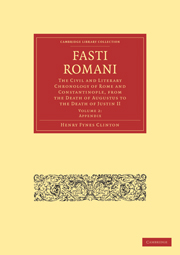 Fasti Romani
Fasti Romani 6 - KINGS OF PARTHIA—KINGS OF PERSIA
Published online by Cambridge University Press: 03 May 2011
Summary
Arsaces founded the Parthian Empire about B.C. 250. He first acquired Parthia and then Hyrcania. His successors gradually extended their dominion over the adjacent provinces until it included almost all the countries East of the Euphrates which had belonged to the old Persian Monarchy. The empire of the Arsacidœ under about 28 kings subsisted 475 years, from the rise of Arsaces in B. C. 250 in the consulship of Manlius and Regulus to the overthrow of Artabanus by Artaxerxes in the beginning of A. D. 226, at the close of the 4th year of Alexander Severus.
Each of the Parthian kings in addition to his own name assumed the name of the founder Arsaces: Strabo XV p. 702. This also appears from Justin, and from the coins of the Parthian kings which shall be described below.
IArsaces. B.C. 250. For the testimonies to Arsaces see F. H. III p. 18 appendix p.311. The two years ascribed to Arsaces by Arrian, if reckoned from his first appearance, are too short a space for his acts. They were probably dated from his ultimate success in the reign of Seleucus Callinicus about B. C. 245. 244
IITiridates. The son of Arsaces according to Justin 41. 5 Hujus filius et successor regni, Arsaces et ipse nomine. His brother according to Arrian : See F. H. III p. 311. Arsaces, whose war with Antiochus in B.C. 209 is described by Polybius X. 28, was Tiridates: Justin. 41. 5 adversus Antiochum Seleucifilium centum millibus peditum et viginti millibus equitum instructum mira virtute pugnavit.
- Type
- Chapter
- Information
- Fasti RomaniThe Civil and Literary Chronology of Rome and Constantinople, from the Death of Augustus to the Death of Justin II, pp. 243 - 263Publisher: Cambridge University PressPrint publication year: 2010First published in: 1850


